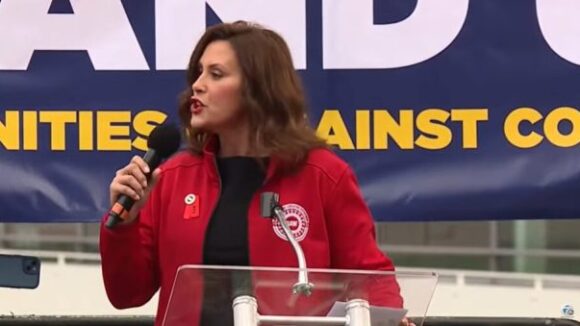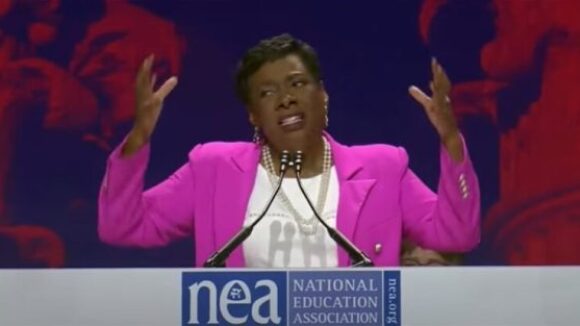Tyranny Triumphs in the Great Lakes State
Ignoring ample evidence of forced unionism’s unfairness and its damaging impact on jobs and incomes, Big Labor Michigan Gov. Gretchen Whitmer signed Right to Work destruction in 2023.
‘Unprecedented Threat’ Against Supreme Court

Big Labor Politicians Out to Undo Janus, by Hook or by Crook
Towards the end of a nakedly political brief they submitted to the U.S. Supreme Court last August that was putatively addressing a Second Amendment case, five Big Labor U.S. senators launched a jarring attack on the principle and practice of judicial independence.
And Democrat Sens. Sheldon Whitehouse (R.I.), Mazie Hirono (Hawaii), Richard Durbin (Ill.), Richard Blumenthal (Conn.), and Kirsten Gillibrand (N.Y.) made it crystal-clear that the High Court’s exercise of its independence in the 2018 Janus decision was a key source of their ire.
Outrage About Janus Not Grounded in Constitution, Statutes, or Common Sense
In Janus v. AFSCME, a case argued and won on behalf of an independent-minded Illinois civil servant by National Right to Work Legal Defense Foundation Staff Attorney William Messenger, the High Court found that the exaction of forced union dues and fees from civil servants as a job condition is unconstitutional.
But according to the five union-label senators, the Janus majority was wrong to “influence” the “sensitive area” of “union power” with its insistence that public employees’ First Amendment rights be respected by union officials and government employers alike.
“The outrage Big Labor and its puppet politicians feel about Janus is undiminished roughly a year-and-a-half after this landmark decision was announced to the public,” commented National Right to Work Committee and Foundation President Mark Mix.
“This outrage, while certainly genuine, isn’t grounded in the U.S. Constitution, federal or state statutes, or common-sense fairness.”
Before Janus, Union Dons Had A License to ‘Interfere’ With Employees’ Free Association
In ruling against top bosses of the American Federation of State, County and Municipal Employees (AFSCME) union and its Illinois-based Council 31 subsidiary, the High Court overturned its 1977 decision in Abood v. Detroit Board of Education.
Michigan public schoolteacher D. Louis Abood and his fellow plaintiffs contended that the labor law of their state violated the First Amendment rights of public servants like themselves by forcing them, as a job condition, to support union-boss advocacy directed at public officials.
The Abood court agreed with the plaintiffs, who received free legal assistance from the Foundation, that the Constitution does not permit forced financial support for Big Labor’s nakedly political activities.
At the same time, Abood gave a judicial wink to forced financial support for government unions’ bargaining-related activities when union officials are granted monopoly power to “represent” employees who don’t want a union, along with those who do.
If legislators grant union officials the latter privilege, theorized Justice Potter Stewart while writing the Abood opinion, legislators must also have the option to empower union bosses to force unwilling workers to pay union dues or fees as a condition of employment.
Justice Stewart admitted all the same that the compulsory payments to unions that were getting a judicial green light may well “interfere in some way with an employee’s freedom to associate for the advancement of ideas, or refrain from doing so, as he sees fit.”
Forty-one years later, Justice Samuel Alito’s Janus opinion, informed in part by the meticulous legal arguments and exhaustive research furnished by the plaintiff and friends of the court who submitted briefs backing his position, exposed Big Labor’s monopoly-bargaining excuse for public-sector forced union dues as unsupportable.
‘Like a Person Shanghaied For an Unwanted Voyage’
To start with, the Janus majority implicitly rebuked government union bosses and the justices who sided with them for refusing to grant any respect to plaintiff Mark Janus’ compelling argument that, as a consequence of union monopoly bargaining, he is “like a person shanghaied for an unwanted voyage.”
There is no respectable rationale for forcing independent-minded civil servants to give money to a private party for being taken to a place they would prefer not to go.
Second, Abood falsely assumed that union bosses would “refuse to serve as the exclusive [monopoly] representative of all employees in the unit” unless they were also “given [forced] agency fees.”
In reality, the Janus majority opinion pointed out, “designation as exclusive representative is avidly sought” in jurisdictions where the Right to Work has long been protected as well as in jurisdictions where it hasn’t been.
Potential Financial Impact Of Decision Is Big Labor Politicians’ Real Concern
Even granting, as the Janus opinion did, the extremely dubious premise that public-sector monopoly bargaining may advance “compelling government interests,” forced fees are completely unneeded to persuade union bosses to seek bargaining privileges that they will demonstrably seek anyway.
“Although, from Right to Work proponents’ perspective, Janus did not go far enough, the opinion’s legal reasoning is unimpeachable,” said Mr. Mix.
“Obviously, it isn’t any defective reading of the law over which Big Labor politicians like Sheldon Whitehouse, Mazie Hirono, Richard Durbin, Richard Blumenthal, and Kirsten Gillibrand are still up in arms a year-and-a-half after Janus was issued.
“They are angry because they fear millions of public servants — in states like Illinois, New York and California — who were forced to bankroll a union pre-Janus as a job condition will ultimately exercise their now-recognized personal freedom to quit the union and cut off all financial support for it.
“Thanks to Janus, union kingpins’ aggregate annual dues extractions could soon decline by a billion dollars or potentially far more. And the Big Labor machine could have substantially less money available to spend helping elect and reelect its favored politicians.”
Michigan’s Experience Could Foreshadow What Will Happen In State After State
Mr. Mix continued: “Union-label politicians’ fear that vast numbers of unionized public employees will over the next few years choose not to be union members, now that they have a real choice, is not irrational.
“The case of Michigan, which, assisted by the advice and counsel of National Right to Work Committee staff and with the generous financial support of Committee members nationwide, passed a Right to Work law in late 2012 that took effect in March 2013, illustrates why.”
Thanks to their state’s Right to Work law, private-sector employees and most public-sector employees were liberated from compulsory unionism just over five year before Janus was decided.
A recent analysis in Michigan Capitol Confidential focused on what happened to the state’s largest teacher union, the NEA-affiliated Michigan Education Association (MEA), to illustrate the impact on erstwhile forced dues-paying workers:
From 2013 through 2019, according to data furnished by the MEA itself, the union’s active, dues-paying ranks fell by nearly 35,000, or 31%.
This happened despite the fact that government union chiefs and school boards colluded on an array of schemes to block educators from resigning their memberships. It is taking years for freedom-loving educators, Foundation attorneys, and other pro-Right to Work attorneys to remove such obstacles.
Four Justices Who Sided Against Mark Janus Are Still on the Court
A Wall Street Journal article published last year singled out the Janus decision as a source of “frustration” among far-left special-interest groups who are pressuring the candidates contending for the 2020 Democrat presidential nomination to pledge to “overhaul” the Supreme Court if they get a chance.
Reporter Joshua Jamerson even brought up the possibility of the next President expanding the number of justices on the court, a scheme that provoked a ferocious public backlash when President Franklin Delano Roosevelt proposed it during the 1930’s.
In their August 2019 brief, Sen. Whitehouse and his cohorts specifically predicted that the High Court could face a “restructuring” if it did not rule as they saw fit. Washington Post columnist Marc Thiessen labels this an “unprecedented threat against the Supreme Court.”
“Even if the threatened ‘restructuring’ never materializes, the Janus decision is far from secure,” commented Mr. Mix.
“A bare 5-4 majority of justices voted in favor of protecting public employees’ First Amendment rights, and all four justices who sided with AFSCME bosses instead are still on the court today.
“Replacing just one of the justices in the Janus majority with a jurist who has a history of Big Labor-friendly judicial activism would suffice to make reversal an immediate possibility.
“That’s why the future of protections for public employees’ freedom not to bankroll speech with which they disagree may well hinge on the outcome of the next presidential election.”
If you have questions about whether union officials are violating your rights, contact the Foundation for free help. To take action by supporting The National Right to Work Committee and fueling the fight against Forced Unionism, click here to donate now.

Ignoring ample evidence of forced unionism’s unfairness and its damaging impact on jobs and incomes, Big Labor Michigan Gov. Gretchen Whitmer signed Right to Work destruction in 2023.

Largely thanks to the Right to Work attorney-won U.S. Supreme Court decision in Janus v. AFSCME, union bosses like NEA President Becky Pringle are no longer able to block virtually all meaningful education policy reforms.

Avelo employee Kim Howard believes all the firm’s flight attendants should get to vote on continued AFA rule. Credit: WTNH-TV (ABC,…